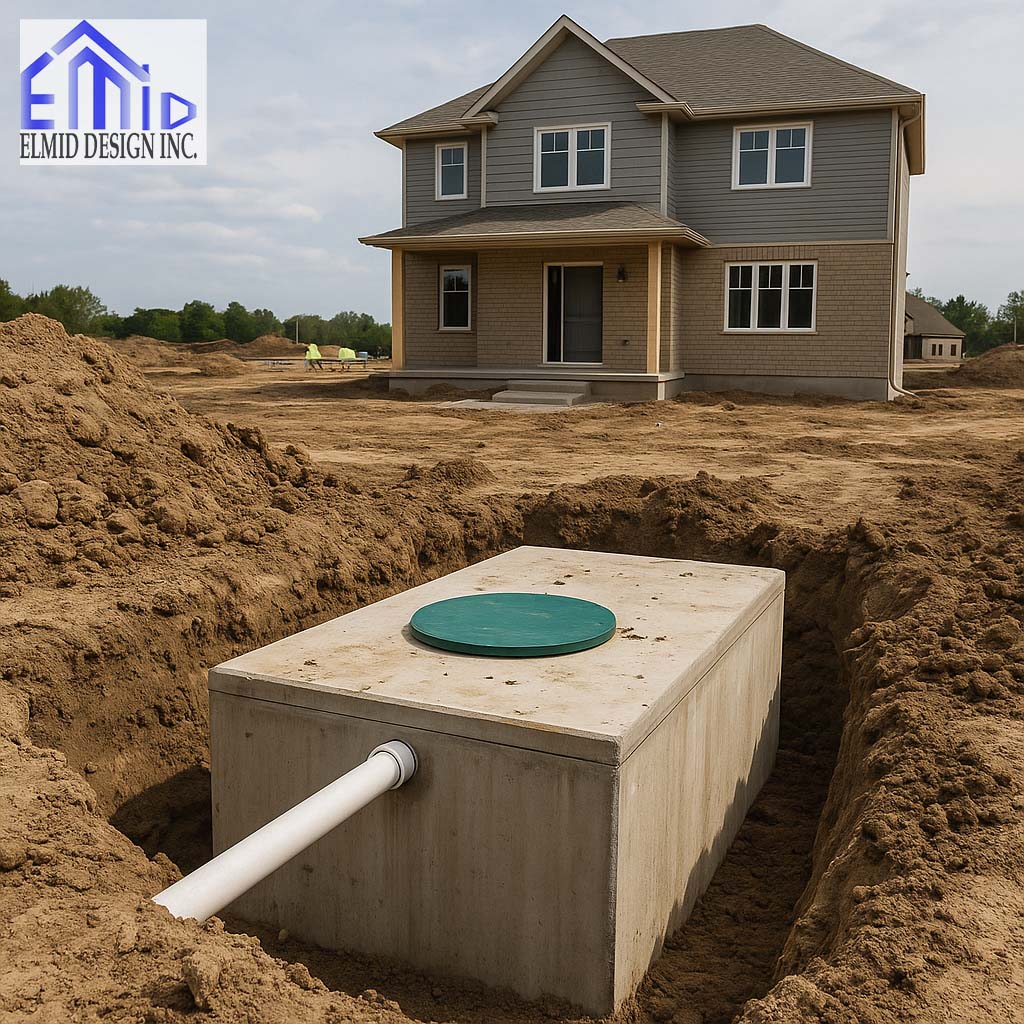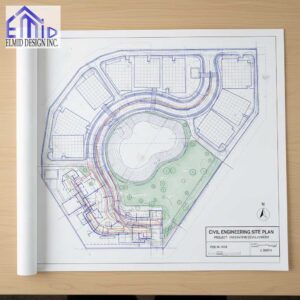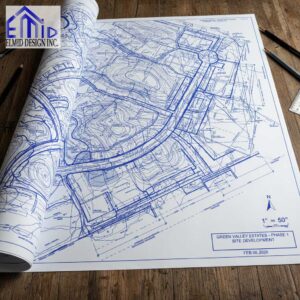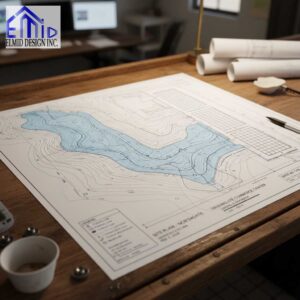Proper Toronto septic design is the foundation of a safe and functional property outside the city’s sewer network. Therefore, designing a septic system in the Toronto area requires technical precision, environmental responsibility, and full compliance with the Ontario Building Code. Moreover, homeowners and builders must understand how soil conditions, property layout, and wastewater volume determine the most effective septic design solution. As a result, a well-designed system protects the environment, preserves property value, and prevents costly failures. In addition, working with a professional engineering firm such as Elmid Design Inc, authorized by Professional Engineers Ontario (PEO), ensures a compliant and durable septic system that meets both regulatory and environmental standards.
Key Takeaways
A successful Toronto septic design depends on accurate soil testing, code compliance, and engineered planning. Local topography and regulations influence design choices and construction methods. Engaging certified engineers ensures environmental protection, long-term functionality, and permit approval. Professional design is not an expense; it is an investment in safety and sustainability.
Why Toronto Septic Design Matters
Septic systems are crucial for properties beyond Toronto’s municipal sewer network. They handle household wastewater safely and naturally when designed correctly. Without proper septic design, wastewater can pollute groundwater, damage the soil, and harm nearby water bodies. Toronto and surrounding regions feature a mix of clay, sand, and shallow bedrock, which require specific engineering strategies. A poor system design often leads to clogging, odors, and expensive replacements. Understanding how Toronto septic design protects both property and environment helps homeowners make informed decisions and meet all local regulatory standards.
Regulations Governing Septic Design in Ontario and Toronto
Septic system design in Toronto follows Part 8 of the Ontario Building Code, which governs onsite wastewater disposal. The regulation defines system capacity, construction standards, and environmental safeguards. Every installation requires municipal or conservation authority approval before construction begins. Engineers use percolation data, topographic mapping, and sewage flow calculations to prepare detailed design drawings. A design by Elmid Design Inc, a PEO-certified firm, demonstrates professional accountability and technical accuracy. Municipal inspectors rely on these certified designs to issue permits and confirm system compliance during inspection. Following code requirements ensures public health and environmental protection across the Greater Toronto Area.
Site Evaluation for Toronto Septic Design
Site evaluation is the first and most important step in Toronto septic design. Engineers conduct a soil percolation test, often referred to as a “T-time,” to measure how quickly wastewater filters through the soil. Clay soils slow down filtration and may need raised or advanced treatment systems. Groundwater level, slope, and bedrock depth are equally significant in determining where and how a system can be installed. Each property’s topography influences trench layout, leaching bed depth, and effluent distribution. Accurate evaluation prevents system overload and premature failure. In areas around Toronto, where land grading varies, an engineered assessment is essential to maintain efficiency and compliance with local standards.
Soil and Groundwater Considerations in Septic Design
The success of any septic design depends heavily on soil composition and groundwater conditions. Sandy soils offer faster filtration but may require increased setback distances from wells or lakes. Clay-rich soils retain water longer, demanding larger leaching beds or advanced treatment units. Groundwater located too close to the surface may contaminate wells if not properly managed. Engineers at Elmid Design Inc calculate soil absorption capacity and design systems that meet environmental and safety thresholds. Maintaining the right balance between percolation rate and effluent volume is critical to prevent pollution and system saturation in the Toronto region.
Designing the Septic Tank and Absorption System
A typical Toronto septic design includes a two-chamber septic tank, effluent filter, and a leaching bed or trench network. The system separates solids, allowing only treated effluent to enter the soil for further filtration. Tank sizing depends on household size and estimated daily wastewater generation. For example, a four-bedroom home may require a larger tank to handle increased sewage volume. The absorption system disperses effluent evenly across gravel-filled trenches, promoting natural biological treatment. In challenging Toronto soils, engineers may recommend shallow buried trenches or mound systems. The design’s goal is to ensure safe wastewater dispersal and long-term performance with minimal maintenance.
Advanced and Alternative Treatment Systems
Certain properties in the Toronto area cannot accommodate conventional septic systems due to limited space, poor soil, or high groundwater. In these cases, advanced or alternative treatment units become necessary. These include aerobic treatment units, peat-based filters, and sand biofilters. Each system enhances wastewater treatment efficiency before effluent reaches the soil. Advanced designs reduce land area requirements while achieving higher environmental performance. Elmid Design Inc specializes in integrating these technologies where standard systems cannot meet local regulations. Every design considers site constraints, flow rates, and maintenance expectations to ensure optimal system longevity and safety.
Permit and Approval Process in Toronto
The permit process for septic systems in Toronto and surrounding municipalities begins with a detailed site plan and soil test report. Once design drawings are prepared by a licensed engineer, the application is submitted to the local health unit or building department. The review process verifies design compliance with Ontario Building Code requirements. After approval, installation must follow the engineered specifications precisely. Final inspections confirm that the system has been built as designed. Using an authorized engineering firm such as Elmid Design Inc guarantees documentation accuracy and professional oversight throughout the process. This systematic approach ensures project success and protects homeowners from future liability.
Common Challenges in Toronto Septic Design
Properties near Toronto often present complex design challenges. Limited lot sizes, steep slopes, and seasonal water table changes can restrict traditional installation methods. Older homes undergoing renovations may need system upgrades to meet new regulatory standards. Engineers must balance performance, cost, and sustainability. Choosing experienced professionals minimizes errors during site analysis and design. With Elmid Design Inc, homeowners gain access to engineering expertise, compliance assurance, and advanced solutions tailored to their property’s conditions. Addressing these challenges early in the process leads to efficient design outcomes and long-term septic system reliability.
Maintenance and Long-Term Performance
A well-designed system performs best when maintained properly. Regular inspection, tank pumping, and effluent filter cleaning prevent premature failure. Ignoring maintenance leads to system clogging, odor issues, and environmental hazards. Engineers design for longevity, but proper care ensures continued performance. In the Toronto area, seasonal changes and soil conditions make professional maintenance schedules essential. Homeowners should consult certified engineers to evaluate system efficiency every few years. Professional follow-up by Elmid Design Inc ensures that the system continues operating within regulatory limits and environmental expectations throughout its lifespan.
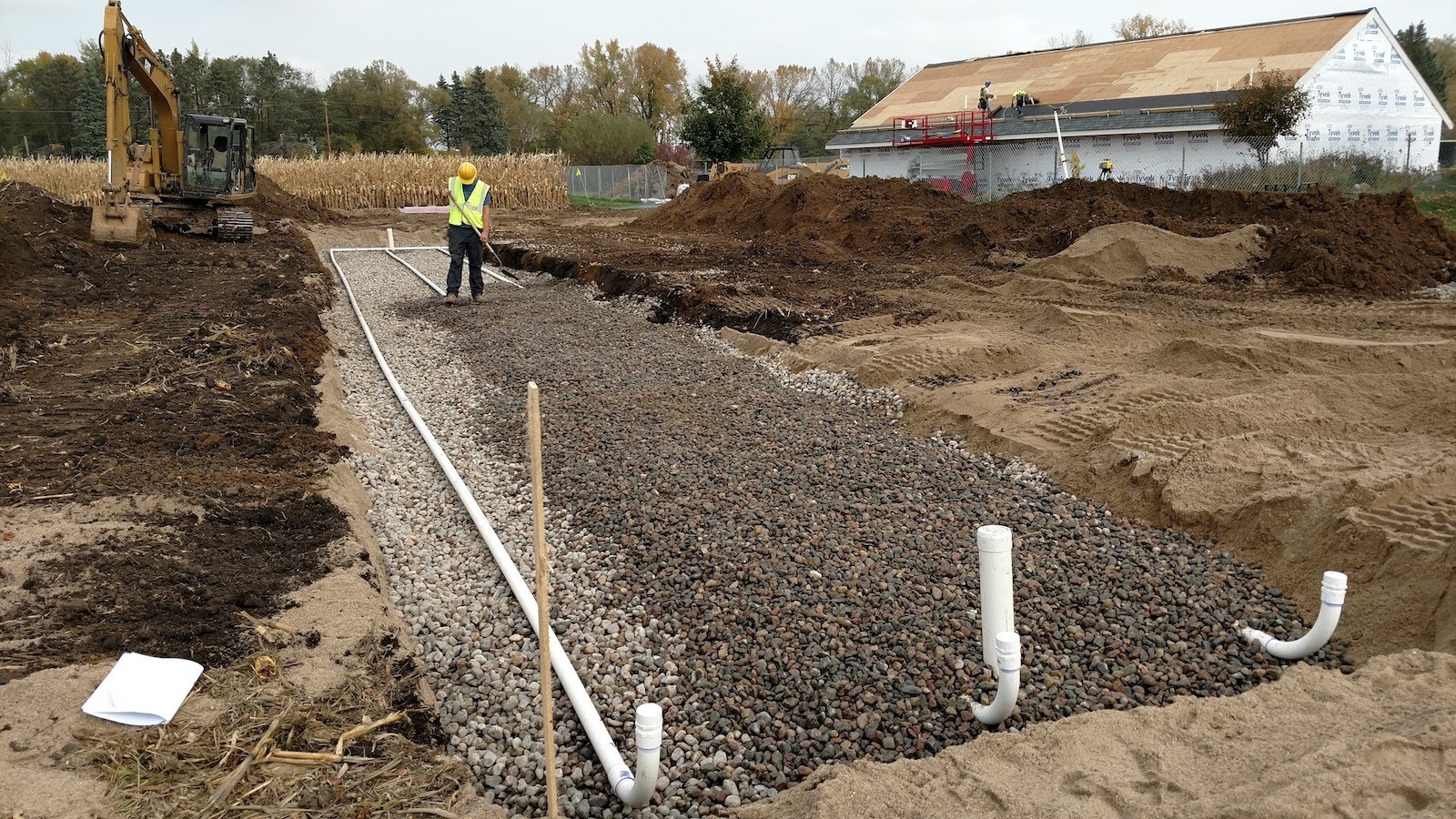
Cost Factors in Toronto Septic Design
The cost of a Toronto septic design depends on several site and system variables. Soil type, lot size, slope, and groundwater level influence the complexity of the design. Sandy soil requires less excavation than dense clay, while small lots often need advanced systems that increase the overall price. The cost of professional engineering design and permit applications must also be included in the budget. Homeowners investing in professional design by Elmid Design Inc, certified by Professional Engineers Ontario, ensure accurate sizing, efficient planning, and full code compliance.
Typical Cost Range and Budget Planning
A residential Toronto septic design may range from modest to complex systems depending on location and property layout. Basic systems for single-family homes cost less due to simpler installation. However, properties with challenging soil or high groundwater require advanced treatment units, which raise design and construction costs. Budget planning should include design fees, permit applications, soil testing, and installation costs. Working with engineers during the planning stage helps control expenses and prevent future repairs. Transparent cost estimation builds confidence and supports long-term project success while aligning with provincial and municipal regulations.
Example of Residential Septic Design in the Toronto Area
Consider a four-bedroom home located on the outskirts of Toronto. The soil consists mainly of sandy loam with moderate drainage. The Toronto septic design includes a two-chamber tank and a standard leaching bed system. This design effectively manages wastewater while maintaining safety and reliability. For the same property built on clay soil, engineers may recommend an alternative treatment unit or raised bed system to improve drainage and protect groundwater. These design variations highlight the importance of soil testing and customized engineering solutions provided by Elmid Design Inc for sustainable wastewater management.
Importance of Professional Engineering in Septic Design
Hiring a licensed professional engineer ensures that every Toronto septic design meets technical and environmental standards. In addition, engineers carefully assess percolation data, calculate wastewater volumes, and design systems that align with the Ontario Building Code. Furthermore, the certification from Professional Engineers Ontario verifies that Elmid Design Inc provides reliable and accountable services for every project. As a result, professional involvement minimizes design errors and guarantees that installations are safe, compliant, and sustainable. Moreover, engineering oversight protects homeowners from legal complications, environmental penalties, and costly reconstruction caused by improper system design or unapproved installations.
Advanced Treatment Technologies for Difficult Sites
In areas where soil and space limit standard designs, advanced septic technologies offer practical solutions. Aerobic treatment units, sand biofilters, and peat-based systems treat wastewater more effectively than traditional methods. These designs allow installation on smaller lots while maintaining regulatory compliance. For Toronto’s variable geology and dense suburban properties, advanced treatment ensures higher efficiency and environmental protection. Engineers from Elmid Design Inc assess whether advanced treatment systems are necessary based on site conditions and regulatory expectations. These engineered systems promote sustainable water management for modern residential developments.
Environmental Protection Through Responsible Design
Proper Toronto septic design plays a critical role in environmental protection. Poorly designed systems can lead to contamination of groundwater and surface water. Engineers ensure that effluent is treated adequately before reaching the soil. Maintaining separation distances from wells, streams, and property boundaries protects ecosystems and human health. In the Greater Toronto Area, environmental awareness drives innovation in septic design, emphasizing sustainability and minimal impact. The expertise of Elmid Design Inc ensures compliance with environmental policies while meeting residential and municipal standards for waste management.
System Installation and Construction Oversight
Once a design is approved, construction must follow the engineered specifications closely. Engineers monitor installation to verify that tank placement, trench layout, and material selection align with the design drawings. Deviations from the approved plan can lead to inspection failure and additional costs. The construction phase includes excavation, tank installation, pipe laying, and leaching bed setup. Professional oversight by Elmid Design Inc ensures precision and accountability at every stage. A properly installed system performs efficiently for years, reducing maintenance costs and preventing environmental issues.
Maintenance and System Monitoring
Every septic system requires regular maintenance to perform effectively. Routine inspections confirm that effluent filters remain clean, tanks are pumped as needed, and trenches drain properly. A Toronto septic design should include accessible components for easy maintenance. Seasonal monitoring is essential in areas with variable water tables. Engineers recommend inspection schedules that extend system lifespan and maintain regulatory compliance. Regular follow-up by Elmid Design Inc verifies that the system continues to function within design limits, supporting long-term environmental safety and homeowner satisfaction.
Common Design Mistakes to Avoid
Homeowners sometimes overlook essential design steps that lead to long-term problems. Skipping soil testing or using unlicensed contractors can result in poor system performance and legal complications. Incorrect tank sizing or improper leaching bed placement may cause premature system failure. Avoiding these mistakes requires professional guidance and adherence to engineering principles. The involvement of Elmid Design Inc ensures each design element is validated before installation. Professional oversight not only enhances reliability but also protects the homeowner’s investment through precision and regulatory compliance.
Future Trends in Septic Design Around Toronto
Septic system design is evolving with advancements in environmental engineering and technology. Modern systems integrate digital monitoring tools that track effluent levels and performance remotely. These innovations improve efficiency and simplify maintenance. In Toronto’s expanding suburbs, smart systems with data-driven monitoring are becoming more common. As sustainability becomes a priority, engineers develop systems that use less energy and minimize soil disruption. The forward-thinking approach of Elmid Design Inc reflects this trend, combining traditional engineering expertise with modern solutions for wastewater management.
Understanding Inspection and Certification Requirements
Before a system becomes operational, it must pass inspection by the municipal building department or health authority. Inspectors verify that the design has been implemented exactly as approved. Certified drawings, material verification, and accurate installation records support successful inspection. A system designed by Elmid Design Inc, authorized by Professional Engineers Ontario, demonstrates professional accountability and technical compliance. Certification assures property owners that their system meets safety and environmental standards. Proper inspection documentation also simplifies future property sales and ensures long-term system reliability.
Long-Term Benefits of a Professionally Designed System
A professionally engineered Toronto septic design delivers efficiency, durability, and environmental protection. The long-term benefits include reduced maintenance costs, fewer system failures, and higher property value. Professionally designed systems treat wastewater thoroughly, protecting soil and groundwater from contamination. Engaging Elmid Design Inc ensures expert evaluation, precision planning, and continuous support through every project phase. Over time, a compliant and efficient septic system enhances property sustainability and aligns with Ontario’s environmental protection goals.
Cost Optimization Strategies in Toronto Septic Design
Cost optimization in Toronto septic design begins with a detailed site analysis. Early soil testing helps engineers identify challenges that could increase construction costs. Addressing these issues during design prevents future repairs and system failures. Efficient material selection and proper sizing reduce expenses without compromising performance. Collaboration between homeowners and engineers ensures that budgets align with technical requirements. Elmid Design Inc, certified by Professional Engineers Ontario, emphasizes planning accuracy to control project costs while maintaining system reliability and environmental safety.
Balancing Quality and Affordability in Septic Projects
Achieving balance between quality and affordability requires professional evaluation of all design variables. Homeowners often reduce costs by selecting inexpensive materials, but this approach can shorten system lifespan. High-quality tanks, durable pipes, and engineered leaching materials offer better long-term value. Experienced engineers design systems that optimize every component for both performance and efficiency. Elmid Design Inc applies engineering judgment to help clients invest wisely in durable and compliant solutions. Sustainable cost planning supports consistent operation and ensures compliance with Ontario Building Code requirements.
Environmental Design Principles in Toronto Septic Systems
Environmental sustainability guides every stage of Toronto septic design. Engineers plan systems that treat wastewater naturally, reduce pollutants, and protect groundwater. Environmentally responsible designs minimize soil disturbance and preserve nearby ecosystems. Proper effluent distribution and adequate setback distances maintain soil health and water quality. Elmid Design Inc integrates environmental engineering techniques into every project, ensuring that septic systems contribute positively to long-term ecological balance. By emphasizing sustainability, septic systems in the Toronto region meet regulatory expectations while supporting environmental resilience.
Climate Considerations in Septic System Design
The Toronto area experiences seasonal temperature changes that affect wastewater treatment efficiency. Freezing conditions can disrupt flow and reduce soil absorption capacity. Engineers design systems with adequate insulation, frost protection, and drainage to prevent winter failures. The depth of installation, soil type, and groundwater level determine appropriate design adjustments. In summer, higher temperatures accelerate biological treatment, improving overall system performance. Addressing climate impact during design ensures continuous operation throughout the year. Elmid Design Inc incorporates these local climate factors into every Toronto septic design for long-term dependability.
Advanced Wastewater Treatment for Urban Properties
Urban and suburban properties near Toronto often face space limitations and stricter environmental regulations. In such cases, advanced wastewater treatment units offer practical and efficient solutions. These systems include aerobic treatment technologies that enhance effluent quality before discharge. Compact treatment units allow installation on smaller lots while maintaining compliance with building and environmental standards. Elmid Design Inc designs advanced systems that meet both performance and space constraints. By applying innovative engineering methods, modern septic systems achieve high treatment efficiency without compromising on safety or sustainability.
The Role of Technology in Modern Septic Design
Technological progress has transformed Toronto septic design into a precise and data-driven process. Engineers now use digital modeling, soil analysis software, and remote monitoring to improve design accuracy. Real-time data allows early detection of performance issues, minimizing maintenance costs. Smart septic systems can monitor effluent levels, detect clogs, and send alerts to service providers. This integration of technology enhances reliability and transparency. Elmid Design Inc employs advanced tools to design and track performance metrics, providing homeowners with confidence and long-term assurance of system quality.
Sustainability and Resource Efficiency in Septic Design
Modern septic designs prioritize sustainability by reducing waste and conserving natural resources. Efficient system sizing minimizes energy use and material consumption. Reuse of treated effluent for irrigation or groundwater recharge supports water conservation. These sustainable practices align with Ontario’s environmental objectives and contribute to community health. Engineers design systems that treat wastewater safely while maintaining ecological balance. Elmid Design Inc continues to lead sustainable Toronto septic design practices that combine environmental stewardship with engineering precision and long-term value.
Long-Term Cost Benefits of Professional Design
Investing in a professionally engineered septic system delivers significant long-term financial benefits. Properly designed systems require fewer repairs, consume less energy, and maintain consistent performance over decades. Homeowners who choose certified engineering firms save money by avoiding costly redesigns and premature replacements. Professional maintenance schedules extend system life and reduce environmental risks. The reliability achieved through professional engineering strengthens property value and homeowner confidence. Elmid Design Inc, authorized by Professional Engineers Ontario, provides the assurance of durability, quality, and regulatory compliance.
Challenges of Aging Septic Systems in Toronto
Many properties in the Toronto region operate older septic systems designed under outdated regulations. Aging systems may lack proper filtration or drainage capacity. Upgrading these systems to meet modern standards often requires redesign or advanced treatment units. Engineers evaluate the existing system’s capacity, soil conditions, and effluent discharge before recommending upgrades. A new Toronto septic design can significantly improve performance and safety while ensuring environmental protection. Elmid Design Inc provides expert guidance for property owners seeking efficient, code-compliant, and sustainable system upgrades.
How Septic Design Supports Property Value in Toronto
A well-designed septic system adds measurable value to a property. Buyers recognize that an engineered system ensures compliance, efficiency, and low maintenance. Properties with documented designs and inspection certificates attract higher resale prices. The presence of a professionally engineered septic design assures potential buyers that wastewater management is safe and sustainable. Elmid Design Inc helps property owners demonstrate design integrity through certified plans and ongoing support. In competitive real estate markets, strong documentation and professional oversight enhance both property appeal and long-term investment security.
Collaboration Between Engineers and Installers
Effective Toronto septic design relies on collaboration between engineers and installation contractors. Engineers develop precise specifications, while installers execute construction according to approved drawings. This teamwork ensures that every stage aligns with regulatory standards and design intent. Ongoing communication between design and construction teams reduces errors and ensures seamless project completion. Elmid Design Inc maintains close coordination with certified installers to ensure that technical accuracy continues through installation and inspection. The result is a reliable, efficient, and long-lasting septic system built to professional standards.
Professional Oversight and Quality Assurance
Quality assurance is essential throughout every phase of septic system development. Engineers conduct periodic inspections, confirm construction materials, and verify installation techniques. This professional oversight eliminates uncertainty and ensures design integrity. By following Ontario Building Code guidelines and municipal requirements, Elmid Design Inc guarantees that each system performs as intended. Continuous monitoring during construction reinforces accountability and demonstrates professional commitment. The combination of precision design and quality assurance produces reliable systems that safeguard both property and environment across the Toronto region.
The Future of Septic Design in Ontario
The future of Toronto septic design aligns with ongoing advancements in environmental engineering and sustainable urban development. In addition, smart technology, improved materials, and real-time data integration will continue transforming how septic systems operate across the region. Furthermore, environmental legislation will encourage innovation toward cleaner and more efficient wastewater solutions. As a result, firms like Elmid Design Inc will remain at the forefront of this transformation by combining engineering excellence with strong environmental awareness. Moreover, the continuous evolution of septic technology ensures that Toronto and surrounding communities maintain safe, sustainable, and compliant wastewater solutions for generations to come.
Final Thoughts
A successful Toronto septic design merges technical precision, environmental awareness, and professional accountability. From soil analysis to system installation, each step demands expertise and attention to detail. Engaging a qualified firm such as Elmid Design Inc, authorized by Professional Engineers Ontario, ensures every project meets safety, environmental, and regulatory expectations. A professionally engineered septic design enhances property value, safeguards the environment, and reflects the highest standards of engineering practice in Ontario.
Frequently Asked Questions
How long does a septic design approval take in Toronto
The approval timeline depends on municipal workload and project complexity. In most cases, it takes between two to four weeks once all design documents and soil test reports are submitted.
How often should a septic system be pumped
Most residential systems need pumping every three to five years, depending on household size and wastewater volume. Regular pumping prevents clogging and system overload.
Can a septic system be installed on a small property in Toronto
Yes, small properties can accommodate advanced or compact treatment systems designed by professional engineers. Site-specific evaluation determines the best solution for limited spaces.
What happens if the system fails inspection
If a system fails inspection, engineers must revise the design or correct construction errors before reinspection. Professional involvement prevents recurring issues and ensures compliance.
Why choose a PEO-authorized engineering firm
A PEO-authorized firm like Elmid Design Inc offers verified expertise, legal accountability, and compliance with professional standards. This certification guarantees trust, safety, and technical excellence.

Elmid Design Inc: Trusted Experts in Toronto Septic Design
Elmid Design Inc is a professional engineering firm specializing in Toronto septic design and onsite wastewater management across Ontario. Authorized by Professional Engineers Ontario (PEO), the company delivers precise, code-compliant, and environmentally responsible engineering solutions. With a commitment to quality, innovation, and regulatory excellence, Elmid Design Inc provides homeowners and developers with reliable septic system designs that meet the highest technical and safety standards. Every project reflects the firm’s dedication to expertise, trust, and sustainable engineering practices that protect both property and environment.
Geographic Locations That We Service:
Our Licensed Professional Engineers specializing in Engineered Site Grading Plans offer the best-engineered site grading plan, lot grading and erosion plan, and drainage plan to obtain site plan approval and building permits in Ontario, including a wide range of municipalities. Each area boasts unique features and requirements, making our tailored approach essential for success.
Toronto and Surrounding Areas
In the vibrant heart of Ontario, we service Toronto (City of Toronto) and surrounding areas. Additionally, we cover Oshawa (City of Oshawa), Pickering (City of Pickering), and Clarington (Municipality of Clarington). Furthermore, our expertise extends to Ajax (Town of Ajax), Whitby (Town of Whitby), Brock (Township of Brock), Scugog (Township of Scugog and Uxbridge (Township of Uxbridge).
Halton Region
Moving to the Halton Region, our services encompass Burlington (City of Burlington) and Halton Hills (Town of Halton Hills). Also included are Milton (Town of Milton) and Oakville (Town of Oakville).
Peel Region
In the Peel Region, we provide services in Brampton (City of Brampton), Mississauga (City of Mississauga), and Caledon (Town of Caledon).
York Region
Our services in the York Region cover Vaughan (City of Vaughan), Aurora (Town of Aurora), and East Gwillimbury (Town of East Gwillimbury). We also cater to Georgina (Town of Georgina), Markham (City of Markham), Newmarket (Town of Newmarket), Richmond Hill (City of Richmond Hill), Whitchurch-Stouffville (Town of Whitchurch-Stouffville), King (Township of King), and Bradford-West Gwillimbury (Town of Bradford-West Gwillimbury). Each municipality here offers a distinct setting, requiring our specialized approach.
Other Southern Ontario Cities and Towns
We also serve many other cities and towns in Southern Ontario. These include Hamilton (City of Hamilton), St. Catharines (City of St. Catharines), Niagara on the Lake (Town of Niagara on the Lake), Brant (County of Brant), Cambridge (City of Cambridge), Kitchener (City of Kitchener), Waterloo (City of Waterloo), and Woodstock (City of Woodstock). Furthermore, we operate in Guelph (City of Guelph), Centre Wellington (Township of Centre Wellington), Shelburne (Town of Shelburne), Orangeville (Town of Orangeville), New Tecumseth (Town of New Tecumseth), Essa (Town of Essa), Collingwood (Town of Collingwood), Wasaga Beach (Town of Wasaga Beach), Barrie (City of Barrie), Midland (Town of Midland), Orillia (City of Orillia), Ramara (Town of Ramara), Minden Hills (Town of Minden Hills), North Kawartha (Town of North Kawartha), Kawartha Lakes (City of Kawartha Lakes), Peterborough (City of Peterborough), Selwyn (Town of Selwyn), and Brighton (Municipality of Brighton).

